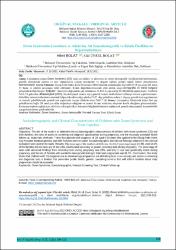Down sendromu tanılı olgularda aile ve çocuğa ait sosyodemografik özelliklerin değerlendirilmesi

View/
Access
info:eu-repo/semantics/openAccesshttp://creativecommons.org/licenses/by-nc/3.0/us/Date
2022Metadata
Show full item recordAbstract
Amaç: Çalışmanın amacı Down Sendromu (DS) tanılı çocuklara ve ailelerine ait sosyo-demografik özelliklerinin belirlenmesi,
gebelik döneminde tarama ve tanı olanaklarına ulaşım oranlarının ve doğum sonrası gerekli sağlık izlemi durumlarının
belirlenmesidir. Gereç-Yöntem: Elazığ Fethi Sekin Şehir Hastanesi Tıbbi Genetik polikliniğine başvuran 0-18 yaş arası DS tanılı
35 hasta ve aileleri çalışmaya dâhil edilmiştir. Klinik değerlendirmesinde elde edilen sosyo-demografik ve klinik bulgular
çalışmada kullanılmıştır. Bulgular: Annelerin doğumdaki yaş ortalaması 36.4±6.3 (yaş aralığı 24-48) olarak saptanmıştır. Ailelerin
%14.3’ü gebelikte ultrasonografi (USG), biyokimyasal tarama veya genetik tarama testlerinden herhangi birisini yaptırmamıştır.
Gebelikte tarama testlerinden anormal bulgu elde edilen olgu yüzdesi %23 olup gebelikte sadece 1 olguya genetik test uygulanmıştı
ve sonraki gebeliklerinde genetik test yaptırmak isteyen ailelerin oranı %45.7 idi. Sonuç: Çalışmamız ülkemizde halen ileri yaş
gebeliklerine bağlı DS tanılı çocuklar doğmakta olduğunu ve tarama ile tanı testlerine ulaşımın kısıtlı olduğunu göstermektedir.
Koruyucu toplum sağlığı için, ailelerin riskli gebelikler hakkında bilgilendirilmesini sağlayacak genetik danışmanlık hizmetlerinin
yaygınlaştırılması gerekmektedir. Objective: The aim of the study is to determine the sociodemographic characteristics of children with down syndrome (DS) and
their families, the rates of access to screening and diagnosis opportunities during pregnancy, and the necessary postnatal health
follow-up. Materials-Methods: Thirty-five patients with diagnosis of DS aged 0-18 years who applied to the Elazig Fethi Sekin
City Hospital Medical genetics and their families were included. Sociodemographic and clinical findings obtained in the clinical
evaluation were used in the study. Results: The mean age of the mothers at birth was 36.4±6.3 years (age range 24-48). And 14.3%
of the families did not have any of the USG, biochemical screening or genetic screening tests during pregnancy. The percentage of
cases with abnormal findings from screening tests during pregnancy was 23%, and only 1 case was genetically tested during
pregnancy, and the rate of families who wanted to have genetic testing in their next pregnancies was 45.7%. Conclusion: Our study
shows that children with DS diagnosis due to advanced age pregnancies are still being born in our country and access to screening
and diagnostic tests is limited. For preventive public health, genetic counseling services that will inform families about risky
pregnancies should be expanded.
Source
Balıkesir Sağlık Bilimleri DergisiVolume
11Issue
1Collections
The following license files are associated with this item:


















